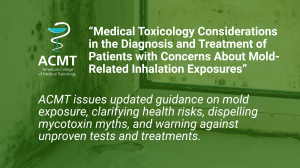Mold Exposure: Updated Guidance Clarifies Risks and Misconceptions
ACMT issues updated guidance on indoor mold exposure, clarifying health risks, dispelling mycotoxin myths, and warning against unproven tests and treatments.
PHOENIX, AZ, UNITED STATES, August 25, 2025 /EINPresswire.com/ -- The American College of Medical Toxicology (ACMT) has issued an updated position statement, “Medical Toxicology Considerations in the Diagnosis and Treatment of Patients with Concerns About Mold-Related Inhalation Exposure.”
The statement reaffirms ACMT’s support of the National Academy of Medicine’s (NAM) 2004 report on Damp Indoor Spaces and Health and incorporates findings from recent international consensus statements, including the 2023 update from the Association of the Scientific Medical Societies in Germany (AWMF).
Key points from ACMT’s position include:
1. Health risks from damp indoor environments: ACMT concurs with NAM and AWMF that damp indoor spaces can contribute to allergic health problems caused by fungi, dust mites, bacteria, cockroaches, and other antigens that thrive in moist environments. Preventing and remediating water damage is critical.
2. Clarifying misconceptions about mycotoxins: While toxigenic fungi exist, evidence does not support the idea that inhaled mycotoxins in home, school, or office environments cause significant toxic health effects.
3. Inappropriate testing and treatments: ACMT cautions against the use of unvalidated diagnostic tests (such as “mycotoxin antibody testing”) and costly, unproven detoxification treatments. These approaches lack scientific support and are not medically appropriate.
4. Focus on evidence-based care: The statement emphasizes that allergic conditions, rather than toxic effects from inhaled mycotoxins, are the primary health concern related to mold exposure. Proper diagnosis and management should be based on validated clinical methods. There is no toxicological evidence, diagnostic test, or treatment to support inhaled mycotoxins from indoor mold as a cause of systemic toxicity.
Lead statement author Jerrold B. Leikin, MD, FACMT, Adjunct Clinical Professor in the Division of Environmental and Occupational Health Sciences and the Occupational and Environmental Medicine Service of UI Health at the University of Illinois at Chicago, added:
“Patients and clinicians alike are often faced with confusing and sometimes misleading information about mold and health. Our updated position provides clarity by highlighting what the science shows—and what it does not. While mold-related allergies are a real concern, the evidence does not support inhaled mycotoxins as a cause of chronic or systemic toxicity in indoor environments.”
The updated statement underscores ACMT’s mission to advance public health by providing evidence-based guidance on toxic exposures.
The full position statement is available on the ACMT website here.
About ACMT: The American College of Medical Toxicology is a professional, nonprofit association of physicians board certified in medical toxicology and other professionals with expertise in this area. ACMT members specialize in the prevention, evaluation, treatment, and monitoring of injury and illness from exposures to drugs and chemicals, as well as biological and radiological agents. Medical Toxicologists work in clinical, academic, governmental, and public health settings, and provide poison control center leadership.
Jessica Irving
American College of Medical Toxicology
communications@acmt.net
Visit us on social media:
LinkedIn
Bluesky
Instagram
Facebook
X
Legal Disclaimer:
EIN Presswire provides this news content "as is" without warranty of any kind. We do not accept any responsibility or liability for the accuracy, content, images, videos, licenses, completeness, legality, or reliability of the information contained in this article. If you have any complaints or copyright issues related to this article, kindly contact the author above.

